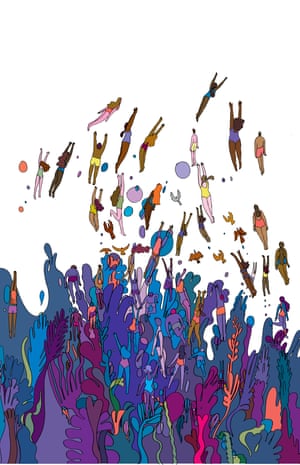‘Hope is an embrace of the unknown’: Rebecca Solnit on living in dark times
We may be living through times of unprecedented change, but in uncertainty lies the power to influence the future. Now is not the time to despair, but to act.
Your opponents would love you to believe that it’s hopeless, that you have no power, that there’s no reason to act, that you can’t win. Hope is a gift you don’t have to surrender, a power you don’t have to throw away. And though hope can be an act of defiance, defiance isn’t enough reason to hope. But there are good reasons.
In 2003 and early 2004, I wrote a book to make the case for hope. Hope in the Dark was, in many ways, of its moment – it was written against the tremendous despair at the height of the Bush administration’s powers and the outset of the war in Iraq. That moment passed long ago, but despair, defeatism, cynicism and the amnesia and assumptions from which they often arise have not dispersed, even as the most wildly, unimaginably magnificent things came to pass. There is a lot of evidence for the defence.
Coming back to the text more than a dozen tumultuous years later, I believe its premises hold up. Progressive, populist and grassroots constituencies have had many victories. Popular power has continued to be a profound force for change. And the changes we have undergone, both wonderful and terrible, are astonishing.
This is an extraordinary time full of vital, transformative movements that could not be foreseen. It is also a nightmarish time. Full engagement requires the ability to perceive both. The 21st century has seen the rise of hideous economic inequality, perhaps due to amnesia both of the working people who countenance declines in wages, working conditions and social services, and the elites who forgot that they conceded to some of these things in the hope of avoiding revolution. The attack on civil liberties, including the right to privacy, continues long after its “global war on terror” justifications have faded away.
Worse than these is the arrival of climate change, faster, harder and more devastating than scientists anticipated. Hope doesn’t mean denying these realities. It means facing them and addressing them by remembering what else the 21st century has brought, including the movements, heroes and shifts in consciousness that address these things now. This has been a truly remarkable decade for movement-building, social change and deep shifts in ideas, perspective and frameworks for large parts of the population (and, of course, backlashes against all those things).
***
It is important to say what hope is not: it is not the belief that everything was, is or will be fine. The evidence is all around us of tremendous suffering and destruction. The hope I am interested in is about broad perspectives with specific possibilities, ones that invite or demand that we act. It is also not a sunny everything-is-getting-better narrative, though it may be a counter to the everything-is-getting-worse one. You could call it an account of complexities and uncertainties, with openings. “Critical thinking without hope is cynicism, but hope without critical thinking is naivety,” the Bulgarian writer Maria Popova recently remarked. And Patrisse Cullors, one of the founders of Black Lives Matter, early on described the movement’s mission as to “Provide hope and inspiration for collective action to build collective power to achieve collective transformation, rooted in grief and rage but pointed towards vision and dreams”. It is a statement that acknowledges that grief and hope can coexist.
The tremendous human rights achievements – not only in gaining rights but in redefining race, gender, sexuality, embodiment, spirituality and the idea of the good life – of the past half-century have flowered during a time of unprecedented ecological destruction and the rise of innovative new means of exploitation. And the rise of new forms of resistance, including resistance enabled by an elegant understanding of that ecology and new ways for people to communicate and organise, and new and exhilarating alliances across distance and difference.

Hope locates itself in the premises that we don’t know what will happen and that in the spaciousness of uncertainty is room to act. When you recognise uncertainty, you recognise that you may be able to influence the outcomes – you alone or you in concert with a few dozen or several million others. Hope is an embrace of the unknown and the unknowable, an alternative to the certainty of both optimists and pessimists. Optimists think it will all be fine without our involvement; pessimists adopt the opposite position; both excuse themselves from acting. It is the belief that what we do matters even though how and when it may matter, who and what it may impact, are not things we can know beforehand. We may not, in fact, know them afterwards either, but they matter all the same, and history is full of people whose influence was most powerful after they were gone.
There are major movements that failed to achieve their goals; there are also comparatively small gestures that mushroomed into successful revolutions. The self-immolation of impoverished, police-harassed produce-seller Mohamed Bouazizi on 17 December 2010, in Tunisia was the spark that lit a revolution in his country and then across northern Africa and other parts of the Arab world in 2011. And though the civil war in Syria and the counter-revolutions after Egypt’s extraordinary uprising might be what most remember, Tunisia’s “jasmine revolution” toppled a dictator and led to peaceful elections in that country in 2014.
Whatever else the Arab spring was, it is an extraordinary example of how unpredictable change is and how potent popular power can be. And five years on, it is too soon to draw conclusions about what it all meant. You can tell the genesis story of the Arab spring other ways. The quiet organising going on in the shadows beforehand matters. So does the comic book about Martin Luther King and civil disobedience that was translated into Arabic and widely distributed in Egypt shortly before the uprising. You can tell of King’s civil disobedience tactics being inspired by Gandhi’s tactics, and Gandhi’s inspired by Tolstoy and the radical acts of noncooperation and sabotage of British female suffragists.
So the threads of ideas weave around the world and through the decades and centuries. There is another lineage for the Arab spring in hip-hop, the African-American music that’s become a global medium for dissent and outrage; Tunisian hip-hop artist El Général was, along with Bouazizi, an instigator of the uprising, and other musicians played roles in articulating the outrage and inspiring the crowds.
After a rain mushrooms appear on the surface of the earth as if from nowhere. Many come from a sometimes vast underground fungus that remains invisible and largely unknown. What we call mushrooms, mycologists call the fruiting body of the larger, less visible fungus. Uprisings and revolutions are often considered to be spontaneous, but it is the less visible long-term organising and groundwork – or underground work – that often laid the foundation. Changes in ideas and values also result from work done by writers, scholars, public intellectuals, social activists and participants in social media. To many, it seems insignificant or peripheral until very different outcomes emerge from transformed assumptions about who and what matters, who should be heard and believed, who has rights.
Ideas at first considered outrageous or ridiculous or extreme gradually become what people think they’ve always believed. How the transformation happened is rarely remembered, in part because it’s compromising: it recalls the mainstream when the mainstream was, say, rabidly homophobic or racist in a way it no longer is; and it recalls that power comes from the shadows and the margins, that our hope is in the dark around the edges, not the limelight of centre stage. Our hope and often our power.
***
Changing the story isn’t enough in itself, but it has often been foundational to real changes. Making an injury visible and public is usually the first step in remedying it, and political change often follows culture, as what was long tolerated is seen to be intolerable, or what was overlooked becomes obvious. Which means that every conflict is in part a battle over the story we tell, or who tells and who is heard.
A victory doesn’t mean that everything is now going to be nice forever and we can therefore all go and lounge around until the end of time. Some activists are afraid that if we acknowledge victory, people will give up the struggle. I have long been more afraid that people will give up and go home or never get started in the first place if they think no victory is possible or fail to recognise the victories already achieved. Marriage equality is not the end of homophobia, but it’s something to celebrate. A victory is a milestone on the road, evidence that sometimes we win and encouragement to keep going, not to stop. Or it should be.
My own inquiry into the grounds for hope has received two great reinforcements in recent years. One came from the recognition of how powerful are the altruistic, idealistic forces already at work in the world. Most of us would say, if asked, that we live in a capitalist society, but vast amounts of how we live our everyday lives – our interactions with and commitments to family lives, friendships, avocations, membership in social, spiritual and political organisations – are in essence noncapitalist or even anticapitalist, made up of things we do for free, out of love and on principle.

In a way, capitalism is an ongoing disaster that anticapitalism alleviates, like a mother cleaning up after her child’s messes. (Or, to extend the analogy, sometimes disciplining that child to clean up after itself, through legislation or protest, or preventing some of the messes in the first place.) And it might be worth adding that noncapitalist ways of doing things are much older than free-market economic arrangements. Activists often speak as though the solutions we need have not yet been launched or invented, as though we are starting from scratch, when often the real goal is to amplify the power and reach of existing options. What we dream of is already present in the world.
The second reinforcement came out of my investigation of how human beings respond to major urban disasters, from the devastating earthquakes in San Francisco (in 1906) and Mexico City (in 1985) to the blitz in London and Hurricane Katrina in New Orleans. The assumption behind much disaster response by the authorities – and the logic of bombing civilians – is that civilisation is a brittle facade, and behind it lies our true nature as monstrous, selfish, chaotic and violent, or as timid, fragile, and helpless. In fact, in most disasters the majority of people are calm, resourceful, altruistic and creative. And civilian bombing campaigns generally fail to break the will of the people
What startled me about the response to disaster was not the virtue, since virtue is often the result of diligence and dutifulness, but the passionate joy that shone out from accounts by people who had barely survived. These people who had lost everything, who were living in rubble or ruins, had found agency, meaning, community, immediacy in their work together with other survivors. This century of testimony suggested how much we want lives of meaningful engagement, of membership in civil society, and how much societal effort goes into keeping us away from these fullest, most powerful selves. But people return to those selves, those ways of self-organising, as if by instinct when the situation demands it. Thus a disaster is a lot like a revolution when it comes to disruption and improvisation, to new roles and an unnerving or exhilarating sense that now anything is possible.
***
“Memory produces hope in the same way that amnesia produces despair,” the theologian Walter Brueggemann noted. It is an extraordinary statement, one that reminds us that though hope is about the future, grounds for hope lie in the records and recollections of the past. We can tell of a past that was nothing but defeats, cruelties and injustices, or of a past that was some lovely golden age now irretrievably lost, or we can tell a more complicated and accurate story, one that has room for the best and worst, for atrocities and liberations, for grief and jubilation. A memory commensurate to the complexity of the past and the whole cast of participants, a memory that includes our power, produces that forward-directed energy called hope.
Amnesia leads to despair in many ways. The status quo would like you to believe it is immutable, inevitable and invulnerable, and lack of memory of a dynamically changing world reinforces this view. In other words, when you don’t know how much things have changed, you don’t see that they are changing or that they can change. Those who think that way don’t remember raids on gay bars when being homosexual was illegal, or rivers that caught fire when unregulated pollution peaked in the 1960s or that there were, worldwide, 70% more seabirds a few decades ago. Thus, they don’t recognise the forces of change at work.
One of the essential aspects of depression is the sense that you will always be mired in this misery, that nothing can or will change. There’s a public equivalent to private depression, a sense that the nation or the society rather than the individual is stuck. Things don’t always change for the better, but they change, and we can play a role in that change if we act. Which is where hope comes in, and memory, the collective memory we call history.
The other affliction amnesia brings is a lack of examples of positive change, of popular power, evidence that we can do it and have done it. George Orwell wrote: “Who controls the past controls the future. Who controls the present controls the past.” Controlling the past begins by knowing it; the stories we tell about who we were and what we did shape what we can and will do. Despair is also often premature: it’s a form of impatience as well as of certainty.
News cycles tend to suggest that change happens in small, sudden bursts or not at all. The struggle to get women the vote took nearly three-quarters of a century. For a time people liked to announce that feminism had failed, as though the project of overturning millennia of social arrangements should achieve its final victories in a few decades, or as though it had stopped. Feminism is just starting, and its manifestations matter in rural Himalayan villages, not just major cities.

Other changes result in victories and are then forgotten. For decades, radicals were preoccupied with Timor-Leste, brutally occupied by Indonesia from 1975 to 2002; the liberated country is no longer news. It won its liberty because of valiant struggle from within, but also because of dedicated groups on the outside who pressured and shamed the governments supporting the Indonesian regime. We could learn a lot from the remarkable display of power and solidarity and Timor-Leste’s eventual victory, but the whole struggle seems forgotten.
We need litanies or recitations or monuments to these victories, so that they are landmarks in everyone’s mind. More broadly, shifts in, say, the status of women are easily overlooked by people who don’t remember that, a few decades ago, reproductive rights were not yet a concept, and there was no recourse for exclusion, discrimination, workplace sexual harassment, most forms of rape, and other crimes against women the legal system did not recognise or even countenance. None of the changes were inevitable, either – people fought for them and won them.
***
Social, cultural or political change does not work in predictable ways or on predictable schedules. The month before the Berlin Wall fell, almost no one anticipated that the Soviet bloc was going to disintegrate all of a sudden (thanks to many factors, including the tremendous power of civil society, nonviolent direct action and hopeful organising going back to the 1970s), any more than anyone, even the participants, foresaw the impact that the Arab spring or Occupy Wall Street or a host of other great uprisings would have. We don’t know what is going to happen, or how, or when, and that very uncertainty is the space of hope.
Those who doubt that these moments matter should note how terrified the authorities and elites are when they erupt. That fear signifies their recognition that popular power is real enough to overturn regimes and rewrite the social contract. And it often has. Sometimes your enemies know what your friends can’t believe. Those who dismiss these moments because of their imperfections, limitations, or incompleteness need to look harder at what joy and hope shine out of them and what real changes have emerged because of them, even if not always in the most obvious or recognisable ways.
Change is rarely straightforward. Sometimes it’s as complex as chaos theory and as slow as evolution. Even things that seem to happen suddenly arise from deep roots in the past or from long-dormant seeds. A young man’s suicide triggers an uprising that inspires other uprisings, but the incident was a spark; the bonfire it lit was laid by activist networks and ideas about civil disobedience, and by the deep desire for justice and freedom that exists everywhere.
It’s important to ask not only what those moments produced in the long run but what they were in their heyday. If people find themselves living in a world in which some hopes are realised and some joys are incandescent and some boundaries between individuals and groups are lowered, even for an hour or a day or several months, that matters. Memory of joy and liberation can become a navigational tool, an identity, a gift.

Paul Goodman famously wrote, “Suppose you had the revolution you are talking and dreaming about. Suppose your side had won, and you had the kind of society that you wanted. How would you live, you personally, in that society? Start living that way now!” It’s an argument for tiny and temporary victories, and for the possibility of partial victories in the absence or even the impossibility of total victories.
Total victory has always seemed like a secular equivalent of paradise: a place where all the problems are solved and there’s nothing to do, a fairly boring place. The absolutists of the old left imagined that victory would, when it came, be total and permanent, which is practically the same as saying that victory was and is impossible and will never come.
It is, in fact, more than possible. It is something that has arrived in innumerable ways, small and large and often incremental, but not in that way that was widely described and expected. So victories slip by unheralded. Failures are more readily detected.
And then every now and then, the possibilities explode. In these moments of rupture, people find themselves members of a “we” that did not until then exist, at least not as an entity with agency and identity and potency; new possibilities suddenly emerge, or that old dream of a just society re-emerges and – at least for a little while – shines. Utopia is sometimes the goal. It is often embedded in the moment itself, and it is a hard moment to explain, since it usually involves hardscrabble ways of living, squabbles and, eventually, disillusion and factionalism. But also more ethereal things: the discovery of personal and collective power, the realisation of dreams, the birth of bigger dreams, a sense of connection that is as emotional as it is political, and lives that change and do not revert to older ways even when the glory subsides.
Sometimes the earth closes over this moment and it has no obvious consequences; sometimes empires crumble and ideologies fall away like shackles. But you don’t know beforehand. People in official institutions devoutly believe they hold the power that matters, though the power we grant them can often be taken back; the violence commanded by governments and militaries often fails, and nonviolent direct-action campaigns often succeed.
The sleeping giant is one name for the public; when it wakes up, when we wake up, we are no longer only the public: we are civil society, the superpower whose nonviolent means are sometimes, for a shining moment, more powerful than violence, more powerful than regimes and armies. We write history with our feet and with our presence and our collective voice and vision. And yet, and of course, everything in the mainstream media suggests that popular resistance is ridiculous, pointless, or criminal, unless it is far away, was long ago, or, ideally, both. These are the forces that prefer the giant stays asleep.
Together we are very powerful, and we have a seldom-told, seldom-remembered history of victories and transformations that can give us confidence that, yes, we can change the world because we have many times before. You row forward looking back, and telling this history is part of helping people navigate toward the future. We need a litany, a rosary, a sutra, a mantra, a war chant of our victories. The past is set in daylight, and it can become a torch we can carry into the night that is the future.
• A new edition of Hope in the Dark by Rebecca Solnit is published by Canongate on 28 July.
